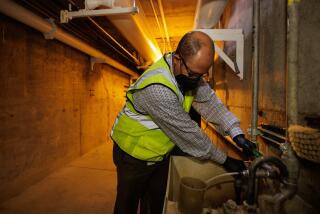Badham Backs Drug Testing of Public Service Workers
- Share via
Rep. Robert E. Badham (R-Newport Beach) told students at Orange Coast College on Monday that he would support laws requiring mandatory drug testing of employees in service-related industries, such as bus drivers.
“If the job is anywhere sensitive, involving life and safety, such as police, such as bus drivers, those sort of people, I very strongly believe in a mandatory (drug) test program,” Badham said. “I find no difficulty with that whatsoever, including (drug testing of) members of Congress.”
Badham, however, stressed that he doesn’t believe in a wholesale expansion of drug testing to all Americans, even though some of the college students said they think such action is needed.
‘Would Violate Out Freedoms’
“We live in a country where this (mandatory drug testing of everyone) would violate our freedoms,” Badham said. “Is that good? Yes, we think it’s good. Can it be abused? Yes, it can. . . . In my view, we need the involvement of every citizen in fighting drugs, and it is the proper province of state and local government to provide drug-awareness programs. . . . Merely throwing money at the problem by the federal government does not work.”
Badham addressed about 150 students at the Costa Mesa-based community college during a forum, then later spoke at a noon luncheon on the campus. Both events were part of drug-awareness programs sponsored by the college’s student government, Associated Students of Orange Coast.
Most of Badham’s talk at the lecture forum dealt with recent actions by Congress in passing laws allowing the military to take police action against drug trafficking. Badham noted that before about three years ago, U.S. federal law forbade the military from assuming police power over civilians, including in drug-trafficking cases.
“Those laws, called posse comitatus , dated back to after the Civil War era,” Badham said. “When the Old West was first settled, the military took the place of civilian police at first, but after the West got more civilized, Congress wanted to make sure that there was civilian control over the military, and the military no longer could act as police.” Badham said that Congress changed the law to allow branches of the U.S. military now to follow suspected drug traffickers “in hot pursuit” onto the U.S. mainland.
Students Urged More Action
Some of the students told Badham that they applauded the federal government anti-drug actions but that they think even more needs to be done.
A student who identified himself as a former Marine said, “Drug testing has worked in the military, and in my opinion, it ought to be done throughout the United States.” Badham said he agreed that mandatory drug testing in the military has greatly reduced the problem, but he reiterated his view that national testing of all Americans, regardless of occupation, would not be right.
Some students said they were skeptical of what the Reagan Administration says it is doing to fight drugs and what it actually does. “Why has the present Administration, in its budget proposals, cut back on drug enforcement and drug rehabilitation programs?” asked one student.
Badham responded, “I don’t think we’ve cut back on drug-enforcement programs because we’ve gone this route of interdicting drug traffic (from foreign countries). Overall, we are increasing our efforts in the drug enforcement area. As far as drug rehabilitation is concerned, I can’t give you an answer on that. . . . We’re trying to prevent (drug abuse) rather than spend more on drug rehabilitation.”
Several students told Badham that they think Congress should spend more money on the drug problem and should help out local governments with the cost of drug-awareness programs. Badham said he thinks Congress is correctly focusing money and federal attention on ways to cut the supply of drugs entering the United States. The effort to cut back the demand--the number of drug users--should mainly be done at the state and local levels, he said.
More to Read
Sign up for Essential California
The most important California stories and recommendations in your inbox every morning.
You may occasionally receive promotional content from the Los Angeles Times.













